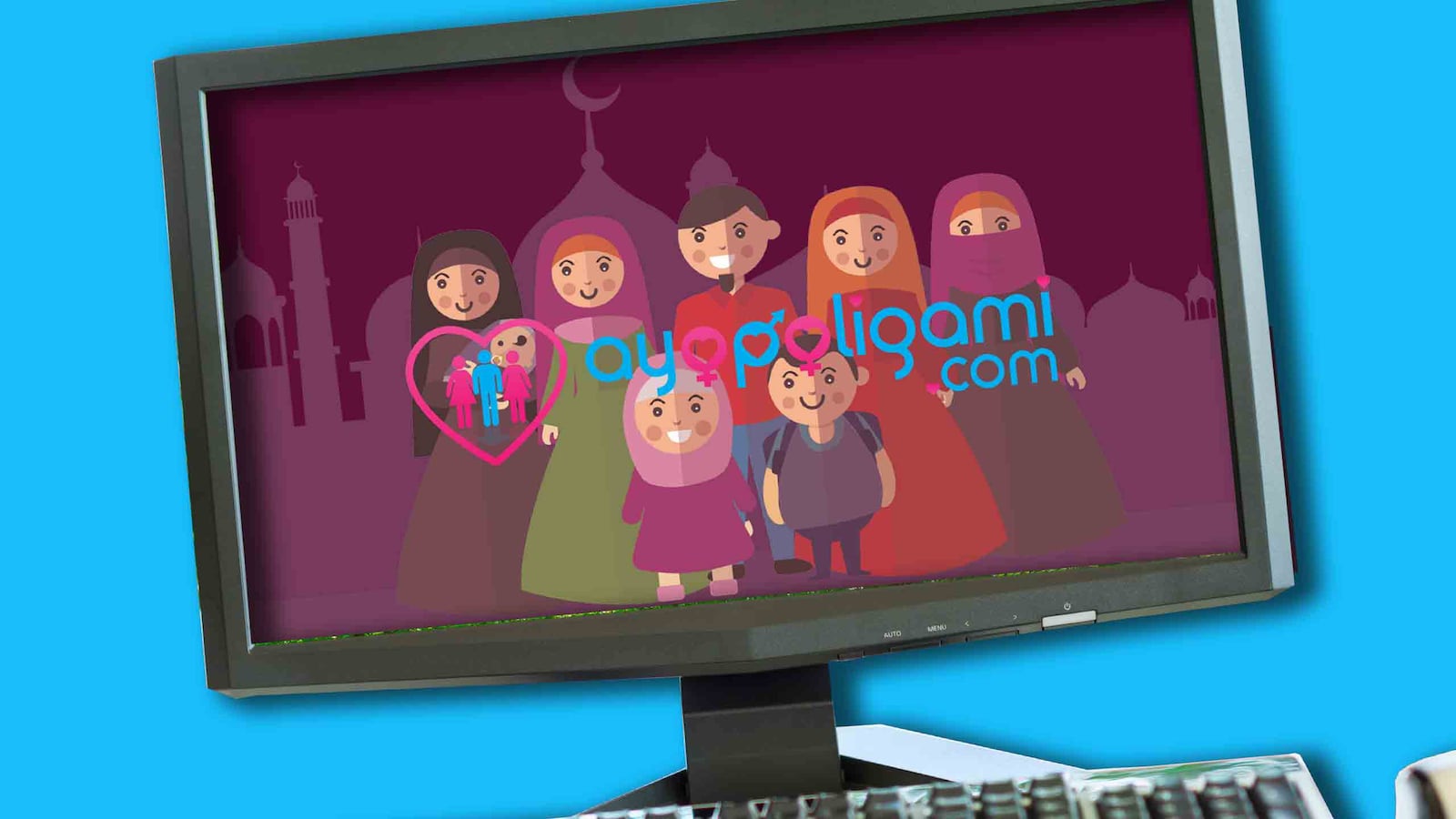JAKARTA—Cipta Lindu, a mild-mannered Jakarta web designer, thought he was, at age 34, getting too old to find a wife, so it was something like altruism, or perhaps a bit of fantasy, that prompted him to create Indonesia’s first dating app for aspiring polygamists. “Ayo Poligami!” (Let’s do polygamy!) was instantly notorious—and popular—when it launched last April, quickly attracting some 50,000 users.
“I had gone through ta’aruf countless times, and it failed every time,” said Lindu, referring to the Islamic practice of getting to know a prospective spouse without actually dating. “I thought I would help others find love, not really thinking of myself.”
Ayo Poligami’s popularity came with an attendant deluge of fake accounts, so Lindu shut it down for a few months to introduce some quality controls, like ID cards and signed consent forms from existing spouses. He relaunched it this month. But that’s not all he did during the app’s hiatus.
Lindu got to know one striking user, Wulan Septi Amanah, who was an early registrant on the app. She said she joined it as a 22-year-old senior in college, “seeking a husband till the Hereafter.” He first suggested her as a prospective match to his friend, another early adopter of the app—and someone who, according to Cipta, was “far more handsome and well-established than me.” But Wulan turned him down because he lived far outside Jakarta. She was, however, open to a ta’aruf request from the matchmaker himself.
After texting and two video calls, Cipta went to meet her parents in July. In less than three hours, they were engaged to be married. He proposed with a five-gram gold ring and an Ambonese sponge cake.
Today, his fortunes have reversed like a latter-day Horatio Alger hero. Ayo Poligami is back on the market with 3000 new user requests each day. And the onetime confirmed bachelor is now happily married, preparing to have a child, and even hopes to add another wife or two, down the road, God-willing. By Indonesian law, he can have up to four. Wulan, for her part, is open to it.
“I want to share my happiness with other women,” she said.
Polygamy is at once largely unpopular but also on the rise in Indonesia, the world’s largest Muslim-majority country. Nina Nurmila, a professor at the State University of Bandung, estimates the prevalence of polygamy at about 5 percent of the population. This is a rough figure, but it’s higher than the rates of polygamy in Egypt and Saudi Arabia, which are around 3 percent, and in obvious contrast to Muslim-majority countries that ban polygamy, like Turkey and Tunisia.
Only men can be polygamous in the Muslim tradition, but under strict conditions that have made it a fairly niche practice worldwide. Those that take additional wives are supposed to treat them all exactly the same, a nearly impossible criterion that has been interpreted by some scholars as tacit discouragement. (That said, 5 percent of Indonesia’s 261 million people would mean about 13 million are practicing polygamy.)
In Indonesia, men are technically required to prove that their first wife is barren, suffering an incurable disease, or unable to perform her “obligations,” on top of getting her consent, before taking additional wives.
“These strict conditions, and the fact that many Indonesian Muslims are more obedient to the rules of classical fiqh [Muslim jurisprudence] than the State… as well as women’s ignorance of the importance of marriage contracts means that most of the Indonesian Muslims who engage in polygamy do not produce records, what you might call ‘informal’ polygamy, which actually violates the law,” said Nurmila.
Nurmila says polygamy is linked to verbal, physical, and psychological violence for the women involved. It’s especially bad for secondary wives, she said, because “in addition to the stigma that is attached as the ‘female usurper’ of someone else’s husband, she also will not get legal protection in the future if there are problems in the marriage.”
One reason for the modern revival of polygamy in Indonesia is, strangely enough, democracy. Polygamy was severely restricted under the Suharto military dictatorship, which only ended in 1998. The fall of Suharto brought democracy and freedom of expression, but also increased religiosity and space for conservative practices.
“I think [polygamy] became more popular because in the old days, people tended to be ashamed of the practice and it was done in silence,” said Nia Dinata, an Indonesian filmmaker who shot a movie about polygamy in 2006, based on her personal experience when her own father took a second wife. “After 1998, Indonesia celebrated democracy and it opened so many doors for people to express their beliefs. Sadly, it included the beliefs of far-right groups as well.”
A steady drip of high-profile incidents has brought polygamy to the public conversation before, although each time, once the furor died down, the practice seemed to continue largely uninterrupted.
In 2003, a Javanese fried-chicken restaurateur took four wives and staged a “Polygamy Award” in Jakarta to promote his lifestyle. The outcry meant the awards ceremony happened only once. Starting in 2009, branches of the “Global Ikhwan” polygamy club opened in the cities of Bandung and Jakarta.
In 2006, the extremely charismatic television preacher known as Aa Gym took a second wife, and his public image actually took a massive hit, as he went from being a leading vice-presidential candidate of several political parties to a virtual pariah, losing millions of dollars in TV contracts and business. A survey from around that time showed that about 75 percent of Indonesian women and 50 percent of Indonesian men disagreed with polygamy.
Worldwide, polygamy is still legal in 48 countries, and legal only for Muslims in five more.
It is unlikely that polygamy will actually be outlawed in Indonesia due to resistance from the religious right, said Nurmila. “And, unfortunately, law enforcement in Indonesia is still weak, so more needs to be done to educate the public about polygamy’s impact, about what happens when women’s marriages are not recorded or the children resulting from such marriages are not recorded.”
The revamped version of Ayo Poligami has oriented the app along more explicitly Islamic lines. Rather than swiping on each other like in Tinder, users can indicate interest in ta’aruf, and then enter into a mediated Telegram channel with Cipta himself, who acts as the virtual chaperone/ matchmaker. Users can be kicked off for “sexy” messages.
If one wanted confirmation that the majority of Indonesians still don’t support polygamy, and that polygamy is harder than it looks, a case in point is that not a single match has yet been made on the app, despite its thousands of users—besides Cipta himself.
One early Ayo Poligami user in Yogyakarta, who downloaded the original version, said, “It was a weird app, with more men than women. Mostly middle class women, who were very religious; they asked me if I could recite the Quran, how often I attend pengajian [recitation/study groups].” He started talking to one teacher on the app but she only wanted to talk about religion, he said. “I froze and didn’t know what to reply.” Their conversation did not progress to the ta’aruf stage. And he’s not interested in downloading the revamped app.
Dinata, who saw her own “moderate Islamic” family get torn apart by her father’s second marriage, thinks it’s “not possible” to practice polygamy fairly. “I think marriage should be based on respect, honesty, equality, and most of all, love,” she said. “Maybe it is only possible if a woman in a polygamous marriage can have several husbands as well… Just kidding!”





